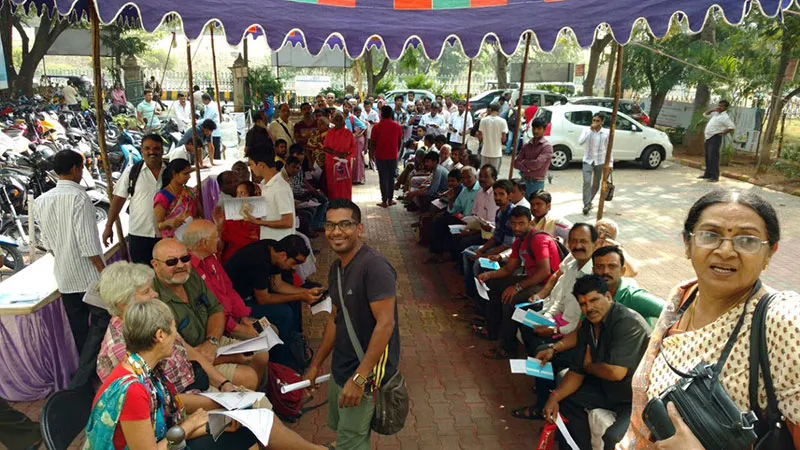We're 16 days into Narendra Modi's grand demonetisation experiment, and almost everyone is utterly confused about what is legal and what is not. The government has come out with dozens of clarifications, extensions, exemptions and changes to the initial rules. Some of them apply to all old notes, some only to old ₹500 notes. Some require bank managers to sign off. Others require additional paperwork. Everything involves standing in a queue.
At this point, nobody with half a working brain cell can claim any more that this was a well-planned process, thought out months, even years in advance — a claim often repeated in the initial WhatsApp forwards. Indeed, the government seems to have worked hard to make all its most dedicated supporters look silly by repeatedly cutting the ground from under their feet. Nothing that's properly planned needs to have over 170 new rules added on (according to one count).
Worst of all, the government seems intent on destroying trust in institutions. The big news in the past day, for example, was that it had chosen to shut down the exchange of old notes for new at banks. This is in spite of the fact that the Prime Minister, in his address to the nation on 8 November, had explicitly said that the limits for exchange would be increased after two weeks. That's what everyone was told, with the additional reassuring message that thus there wasnt any hurry. Instead, the government ended the exchanges with a couple of hours' notice. Naturally, people are going to have a hard time trusting the government — or the Reserve Bank of India — after this. The RBI said solemnly that the common man "should have" finished exchanging all their cash by now. Really? How do they know? Did the members of the RBI board conduct or commission any studies on the subject? If so, they should tell us. It would be a historic moment, after all — the first time that Indians did anything ahead of schedule instead of a few hours before the deadline.
Let's be clear: It's wonderful that many people now have Jan Dhan accounts. And yes, they can deposit old bills into these accounts. But not everyone has them. The BJP claims that "every family" has one, but that's disputed, and probably untrue. And even were it true, the point of keeping cash for many — especially women — is to deny other family members access to your savings. But of course, women with experience of rural areas were unlikely to be involved in planning this process.
So where are we now? We have a government that launched a vast, draconian scheme with minimal planning. It's discovered that the economy is a complex organism, too complex to be caught in a simple net. There are many ways to evade a net the government in its charming innocence thought had no holes. So it's detailed various rules to make it harder to evade the net. But it's simultaneously hearing from its own party officials that too many people are suffering — so it's created additional holes, to help those people escape. In the process, it will have made it easier for those who have connections and experience of tax avoidance to evade the net, and has made it harder for those who have done nothing wrong. And, incidentally, this was an entirely predictable consequence, if they had bothered to ask an independent economist or two beforehand.
So the government will now unleash its famously competent and incorruptible investigators on the system. Note that laundering on an epic scale has already happened — over 15,000 crore has been deposited in various Jan Dhan accounts, and 4,500 crore has already been withdrawn. A goodly amount of that may have been laundered. Given the financial literacy of many Jan Dhan account holders and how many of those accounts have been inactive, many branch managers could have been manipulating those accounts with the account holder's knowledge. But not to worry! Our intrepid investigators are on it. They're bound to find the real culprits. You shouldn't worry that it will turn into a festival of bribery and corruption — why would it? Vast amounts of discretion being provided to tax officers has always worked well in India. You can tell they know what they're doing — they're raiding post offices at the moment, which is exactly where the Ambani-Adani types are standing in line to launder their cash.
But don't complain. It's become dangerous now to complain. The government isn't interested in giving you a hearing and fixing things — it's decided instead to badmouth anyone who's dissatisfied. The PM himself has said that critics of the implementation of demonetisation are not upset about the government's preparedness — they're just upset that they themselves didn't have time to prepare.
In other words, if you express concern that your government has bungled on this massive scale, you are doing so because you have black money. You're not a critic, you're a criminal. Job done! It makes the task of future income tax investigations so easy, right? Just check Facebook for people complaining — and there you are! That's the criminals. Tax officials should wander the lines outside banks looking for people who aren't praising the PM's brilliance loudly enough, and conduct on-the-spot audits. After all, we are really, really bad at planning and implementing big steps like demonetisation — but going after critics and conducting arbitrary raids are the Indian state's core competence. They do it really well. Is it any surprise that that's what this demonetisation process will devolve into?
This commentary originally appeared in NDTV.
The views expressed above belong to the author(s). ORF research and analyses now available on Telegram! Click here to access our curated content — blogs, longforms and interviews.




 PREV
PREV


